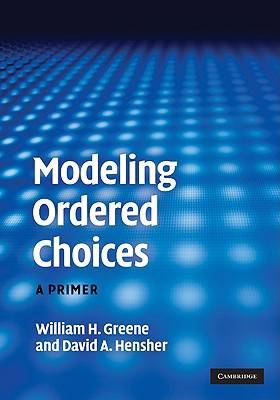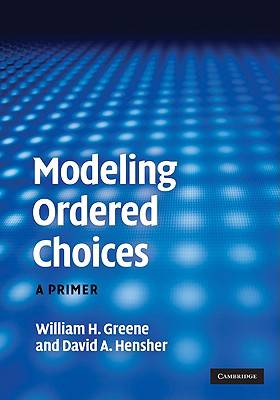
- Afhalen na 1 uur in een winkel met voorraad
- Gratis thuislevering in België vanaf € 30
- Ruim aanbod met 7 miljoen producten
- Afhalen na 1 uur in een winkel met voorraad
- Gratis thuislevering in België vanaf € 30
- Ruim aanbod met 7 miljoen producten
Zoeken
€ 153,95
+ 307 punten
Omschrijving
It is increasingly common for analysts to seek out the opinions of individuals and organizations using attitudinal scales such as degree of satisfaction or importance attached to an issue. Examples include levels of obesity, seriousness of a health condition, attitudes towards service levels, opinions on products, voting intentions, and the degree of clarity of contracts. Ordered choice models provide a relevant methodology for capturing the sources of influence that explain the choice made amongst a set of ordered alternatives. The methods have evolved to a level of sophistication that can allow for heterogeneity in the threshold parameters, in the explanatory variables (through random parameters), and in the decomposition of the residual variance. This book brings together contributions in ordered choice modeling from a number of disciplines, synthesizing developments over the last fifty years, and suggests useful extensions to account for the wide range of sources of influence on choice.
Specificaties
Betrokkenen
- Auteur(s):
- Uitgeverij:
Inhoud
- Aantal bladzijden:
- 382
- Taal:
- Engels
Eigenschappen
- Productcode (EAN):
- 9780521194204
- Verschijningsdatum:
- 17/05/2010
- Uitvoering:
- Hardcover
- Formaat:
- Ongenaaid / garenloos gebonden
- Afmetingen:
- 173 mm x 246 mm
- Gewicht:
- 907 g

Alleen bij Standaard Boekhandel
+ 307 punten op je klantenkaart van Standaard Boekhandel
Beoordelingen
We publiceren alleen reviews die voldoen aan de voorwaarden voor reviews. Bekijk onze voorwaarden voor reviews.











